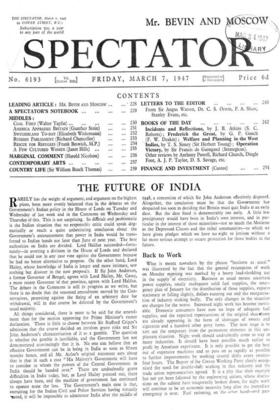THE FUTURE OF INDIA
RARELY has the weight of argument, and argument on the highest plane, been more evenly balanced than in the debates on the Government's Indian policy in the House of Lords on Tuesday and Wednesday of last week and in the Commons on Wednesday and Thursday of this. This is not surprising. So difficult and problematic is the Indian situation that no responsible critic could speak dog- matically or reach a quite unhesitating conclusion about the Government's announcement that power in India would be trans- ferred to Indian hands not later than June of next year. The best authorities on India are divided. Lord Halifax succeeded—fortu- nately—in averting a division in the House of Lords and declared that he could not in any case vote against the Government because he had no better alternative to propose. On the other hand, Lord Hailey, whose knowledge of India is longer and more intimate, saw nothing but disaster in the new proposals. If Sir John Anderson, a former Governor of Bengal, agrees with Lord Halley, Mr. Casey, a more recent Governor 'of that province, agrees with Lord Halifax. The debate in the Commons is still in progress as we write, but there is no doubt that the reasoned amendment moved by the Con- servatives, protesting against the fixing of an arbitrary date for withdrawal, will in due course be defeated by the Government's usual majority.
All things considered, there is more to be said for the amend- ment than for the motion approving the Prime Minister's recent declaration. There is little to choose between Sir Stafford Cripps's admission that the course decided on involves grave risks and Sir John Anderson's characterisation of it as a gamble. The question is whether the gamble is justifiable, and the Government has not demonstrated convincingly that it is. No one can believe that an effective Government can be in being in India as soon as fifteen months hence, and all Mr. Attlee's original statement says about that is that in such a case "His Majesty's Government will have to consider to whom the powers of the Central Government in India should be handed over." There are undoubtedly grave difficulties in India today, but, as Lord Halley pointed out, there always have been, and the machine of government has continued to operate none the less. The Government's main case is that, recruiting for the Indian Civil and Police Services having virtually leased, it will be impossible to administer India after the middle of 1948, a contention of which Sir John Anderson effectively disposed. Altogether, the conclusion must be that the Government has despaired too soon in deciding that Britain must quit India at an early date. But the date fixed is demonstrably too early. A little less precipitancy would have been in India's own interest, and in par- ticular in the interest of those minorities—not so much the Moslems as the Depressed Classes and the tribal communities—to which we have given pledges which we have no right to jettison without a far more serious attempt to secure protection for those bodies in the future.


































